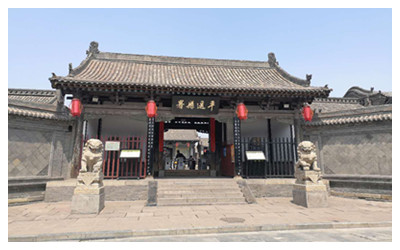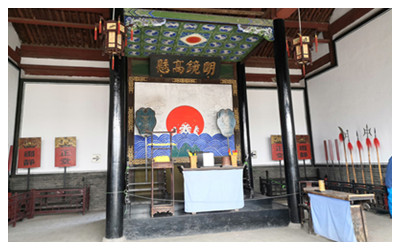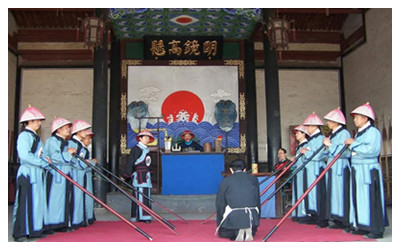- Home
- China Provinces Guide > Shanxi > Shanxi Attractions >
Pingyao Ancient Government Office
Pingyao Ancient Government Office, situated on Yamen Street to the southwest of Pingyao Ancient City, is the largest and best-preserved existing ancient county government office in China. With a length of 203 meters and a width of 131 meters, it covers approximately 26,000 square meters.
History & Layout

Pingyao Ancient Government Office dates back to the Northern Wei Dynasty (386-534). The oldest remaining building was constructed in 1346, more than 600 years ago. The County Annals recorded that in 1303 a big earthquake took place in Pingyao and the county government was destroyed. More than 100 magistrates in the Ming and
Qing Dynasties reconstructed the government and successively added new buildings. In 1949, Ancient Government Office was replaced with the People’s Government of Pingyao County and most old buildings were dismantled. After the government offices moved out in 1998, this site was restored and opened to the public as Pingyao County Government Museum.
The overall ancient government office architecture shows a traditional Chinese feature of facing south and being symmetrical. There are six rows of buildings along the central axis, respectively front gate, secondary gate (Yi Gate), primary law court, secondary law court, inner chambers and fox spirit pavilion. Outside the front gate to the right, is a civil conciliation agency── Shenming Pavilion.
What to see?
Come here,you can learn of the bureaucratic culture of Ming and Qing dynasties (1368-1912) from its architecture, plaques, and couplets.
Walking into Ancient Government Office, you must past the secondary gate, Yi Gate. Yi Gate, meaning etiquette gate in Chinese, only opened when the county magistrate went out for a tour of inspection, had distinguished guests or held major celebrations. Generally the east corner gate was for people to use and the west corner gate was used to arraign prisoners.
 The Primary Law Court
The Primary Law CourtThe primary law court is the main place for magistrates to handle official affairs or criminal cases at 9 o’clock every morning, thus it is the center of the whole Pingyao Ancient Government Office. The painting on the screen depicts mountain, waves and sun. Along with the plaque on the wall saying “a mirror of justice hung overhead”, this is to mean that the magistrate is fair and honest.
The Secondary Law Court
The secondary law court in Pingyao Ancient Government Office has its own door, and is connected with the inner chamber. It is where the magistrate dealt with daily routines, called in subordinates, met with guests or heard civil cases therefore it is not as solemn as the primary court.
The Inner Chamber
The inner chamber is behind the secondary court. The main chamber contains five rooms. The middle three rooms are living rooms with a study and bedroom on either side. Wing rooms are guestrooms for magistrates’ superiors and friends. Some secret and in camera cases were handled here in the living room.
Fox Spirit Pavilion
Fox spirit pavilion is the only
Yuan Dynasty (1271-1368) building remaining today in Pingyao Ancient Government Office. A fox spirit was enshrined here because officials at that time believed that it would be propitious for their office and their career.
 Prison inside Pingyao Ancient Government Office
Prison inside Pingyao Ancient Government OfficeOn the west side of the office is the prison. This is the only
Qing prison remaining in
China. Even the prison demonstrates a hierarchy; cells for prisoners originally with high social status have a bed and a window while cells for common felons have no window and extra-thick walls. Here you can also see some horrifying ancient implements of torture.
Court Trials Performance
There is a short play about how the ancient county magistrate held court trials in the primary law court every day. This plays at 9:30, 11:00 and 15:30. Go there a little earlier to obtain a good seat for the performance.
Travel Tips
Add: on Yamen Street to the southwest of Pingyao Ancient City
Opening Hours:08:00-17:30
Entrance Fees: CNY 125
 Pingyao Ancient Government Office dates back to the Northern Wei Dynasty (386-534). The oldest remaining building was constructed in 1346, more than 600 years ago. The County Annals recorded that in 1303 a big earthquake took place in Pingyao and the county government was destroyed. More than 100 magistrates in the Ming and Qing Dynasties reconstructed the government and successively added new buildings. In 1949, Ancient Government Office was replaced with the People’s Government of Pingyao County and most old buildings were dismantled. After the government offices moved out in 1998, this site was restored and opened to the public as Pingyao County Government Museum.
Pingyao Ancient Government Office dates back to the Northern Wei Dynasty (386-534). The oldest remaining building was constructed in 1346, more than 600 years ago. The County Annals recorded that in 1303 a big earthquake took place in Pingyao and the county government was destroyed. More than 100 magistrates in the Ming and Qing Dynasties reconstructed the government and successively added new buildings. In 1949, Ancient Government Office was replaced with the People’s Government of Pingyao County and most old buildings were dismantled. After the government offices moved out in 1998, this site was restored and opened to the public as Pingyao County Government Museum. The Primary Law Court
The Primary Law Court Prison inside Pingyao Ancient Government Office
Prison inside Pingyao Ancient Government Office Ask Questions ?
Ask Questions ?